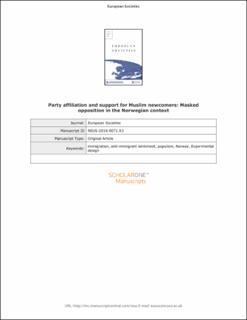Party affiliation and support for Muslim newcomers: masked opposition in the Norwegian context
Peer reviewed, Journal article
Accepted version

Åpne
Permanent lenke
https://hdl.handle.net/11250/2733539Utgivelsesdato
2020Metadata
Vis full innførselSamlinger
Sammendrag
This work considers how anti-immigrant sentiment is selectively revealed, offering a new perspective on the role stigma plays in defining the political mainstream. By way of a survey experiment in Norway, we measure the gap between what people express and the beliefs they hold anonymously, assessing how supporters of distinct political parties situationally conform to expectations about the expression of intolerance. Using three frames, we contrast attitudes toward immigrants, refugees and more general types of new entrants to Norway. We conclude that the intolerance is more widespread than openly expressed sentiment would suggest due to the systematic masking of targeted opposition to Muslim newcomers. Covert expression, under conditions of absolute and permanent anonymity, demonstrate hardened sentiment among the mainstream right. In other words, a large shift in covert attitudes is best understood as a shift in deference to norms about the expression of targeted bias – in this case toward Muslim newcomers – rather than a large change in underlying, anonymously expressed attitudes.